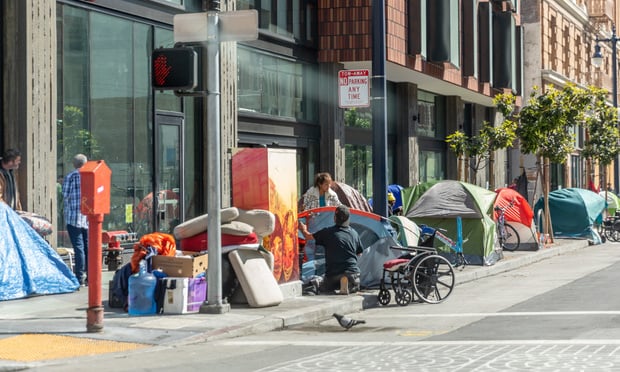UC Hastings, Other Tenderloin Residents Sue San Francisco Over 'Insufferable' Sidewalk Conditions Amid COVID-19
"The conditions now prevailing in the Tenderloin constitute a violation of the fundamental civil rights of those residing and working there," wrote lawyers for Tenderloin residents suing to force the city to confront encampments and drug-dealing on neighborhood sidewalks.
May 04, 2020 at 02:33 PM
5 minute read
 Homeless camp on Eddy and Taylor in San Francisco's Tenderloin on April 3, 2020. Photo: Jason Doiy/ALM
Homeless camp on Eddy and Taylor in San Francisco's Tenderloin on April 3, 2020. Photo: Jason Doiy/ALM
A coalition of businesses and residents of San Francisco's Tenderloin neighborhood, led by the University of California, Hastings College of the Law, have sued the city and county claiming that government officials have allowed the area to become "a containment zone" for drug and homelessness issues in the city.
The federal lawsuit, filed Monday by lawyers at Walkup, Melodia, Kelly & Schoenberger in San Francisco and Greenberg Gross in Los Angeles, claims that the number of homeless people in tents on sidewalks in the working-class neighborhood has more than doubled since March when local "shelter in place" orders took effect to combat the spread of COVID-19. The plaintiffs, who include a local resident confined to a wheelchair, a manager at a single-room-occupancy hotel, and the part-owner of a local cafe, claim that the increase of people residing in the streets has combined with the open-air drug sales in the neighborhood to make conditions "insufferable."
"This is a matter of fundamental fairness; what is a citywide problem should not be allowed to weigh disproportionately on a low-income working-class neighborhood," the complaint says. "San Francisco should be prohibited from abandoning a single neighborhood, in an apparent effort to spare other neighborhoods the burdens that confront the city at-large."
The complaint brings 14 claims for relief against the city and county including claims that San Francisco's policies regarding the Tenderloin violate the Equal Protection and Due Process clauses of the U.S. Constitution and that the conditions on the streets in the neighborhood violate the Americans with Disabilities Act and amount to a public nuisance. The plaintiffs, in announcing the lawsuit Monday, said they are seeking to force the city to provide solutions for those who currently occupy the sidewalk encampments that take into consideration the safety and health of both those on the street and other neighborhood residents.
"What has long been suffered in the Tenderloin has become insufferable," the complaint says. "The conditions now prevailing in the Tenderloin constitute a violation of the fundamental civil rights of those residing and working there," the complaint says.
According to the complaint, a recent survey by the nonprofit organization that cleans litter in the Tenderloin and adjacent neighborhoods found that the number of tents and makeshift shelters there grew from 158 March 3 to 391 May 1. The suit also says that the law school has spent an additional $66,836 on increased safety and security in the first month of the COVID-19 pandemic.
"This case is not about anybody seeking money," said Walkup Melodia's Michael Kelly in a press conference announcing the lawsuit's filing. Kelly, a UC Hastings alum, said although the city had been studying what's going on in the Tenderloin, the time for action is now. "The streets of the Tenderloin were not intended to be campgrounds," he said.
 Dean David Faigman, UC Hastings
Dean David Faigman, UC HastingsDavid Faigman, chancellor and dean of UC Hastings, said Monday that the lawsuit was seeking a safe and healthy environment for the school's "housed and unhoused neighbors." The dean said that the school had "no other options and no more time to wait." Faigman said in the near term, the lawsuit seeks the immediate deployment of latrines, wash stations and potable water in the neighborhood and access to hotel rooms and COVID-19 tests for those living on the streets. Faigman said that the suit also seeks the immediate relocation of tents away from doorways of homes and businesses. In the intermediate term, the suit seeks the identification of plazas, parks and parking lots that might offer safer places for temporary encampments where residents can practice social distancing.
The lawsuit notes that students who decline offers of admission to the law school frequently cite the conditions in the neighborhood as a significant factor in their decisions. According to the complaint, one such student responded to a 2020 survey from the school saying: "One of the big reasons I did not go to Hastings is the homeless population surrounding the campus. I quite honestly did not feel safe, and I could not imagine walking home alone at night. I was looking forward to living in San Francisco but was shocked by the magnitude of the drug use surrounding the campus. … My family was harassed and approached by a drug dealer when walking around the campus. I could not imagine attending school in a place where this is a daily occurrence."
This content has been archived. It is available through our partners, LexisNexis® and Bloomberg Law.
To view this content, please continue to their sites.
Not a Lexis Subscriber?
Subscribe Now
Not a Bloomberg Law Subscriber?
Subscribe Now
NOT FOR REPRINT
© 2025 ALM Global, LLC, All Rights Reserved. Request academic re-use from www.copyright.com. All other uses, submit a request to [email protected]. For more information visit Asset & Logo Licensing.
You Might Like
View All


Federal Judge Pauses Trump Funding Freeze as Democratic AGs Plan Suit
4 minute read
Law Firms Mentioned
Trending Stories
- 1Trump's DOJ Files Lawsuit Seeking to Block $14B Tech Merger
- 2'No Retributive Actions,' Kash Patel Pledges if Confirmed to FBI
- 3Justice Department Sues to Block $14 Billion Juniper Buyout by Hewlett Packard Enterprise
- 4A Texas Lawyer Just Rose to the Trump Administration
- 5Hogan Lovells Hires White & Case Corporate and Finance Team in Italy
Who Got The Work
J. Brugh Lower of Gibbons has entered an appearance for industrial equipment supplier Devco Corporation in a pending trademark infringement lawsuit. The suit, accusing the defendant of selling knock-off Graco products, was filed Dec. 18 in New Jersey District Court by Rivkin Radler on behalf of Graco Inc. and Graco Minnesota. The case, assigned to U.S. District Judge Zahid N. Quraishi, is 3:24-cv-11294, Graco Inc. et al v. Devco Corporation.
Who Got The Work
Rebecca Maller-Stein and Kent A. Yalowitz of Arnold & Porter Kaye Scholer have entered their appearances for Hanaco Venture Capital and its executives, Lior Prosor and David Frankel, in a pending securities lawsuit. The action, filed on Dec. 24 in New York Southern District Court by Zell, Aron & Co. on behalf of Goldeneye Advisors, accuses the defendants of negligently and fraudulently managing the plaintiff's $1 million investment. The case, assigned to U.S. District Judge Vernon S. Broderick, is 1:24-cv-09918, Goldeneye Advisors, LLC v. Hanaco Venture Capital, Ltd. et al.
Who Got The Work
Attorneys from A&O Shearman has stepped in as defense counsel for Toronto-Dominion Bank and other defendants in a pending securities class action. The suit, filed Dec. 11 in New York Southern District Court by Bleichmar Fonti & Auld, accuses the defendants of concealing the bank's 'pervasive' deficiencies in regards to its compliance with the Bank Secrecy Act and the quality of its anti-money laundering controls. The case, assigned to U.S. District Judge Arun Subramanian, is 1:24-cv-09445, Gonzalez v. The Toronto-Dominion Bank et al.
Who Got The Work
Crown Castle International, a Pennsylvania company providing shared communications infrastructure, has turned to Luke D. Wolf of Gordon Rees Scully Mansukhani to fend off a pending breach-of-contract lawsuit. The court action, filed Nov. 25 in Michigan Eastern District Court by Hooper Hathaway PC on behalf of The Town Residences LLC, accuses Crown Castle of failing to transfer approximately $30,000 in utility payments from T-Mobile in breach of a roof-top lease and assignment agreement. The case, assigned to U.S. District Judge Susan K. Declercq, is 2:24-cv-13131, The Town Residences LLC v. T-Mobile US, Inc. et al.
Who Got The Work
Wilfred P. Coronato and Daniel M. Schwartz of McCarter & English have stepped in as defense counsel to Electrolux Home Products Inc. in a pending product liability lawsuit. The court action, filed Nov. 26 in New York Eastern District Court by Poulos Lopiccolo PC and Nagel Rice LLP on behalf of David Stern, alleges that the defendant's refrigerators’ drawers and shelving repeatedly break and fall apart within months after purchase. The case, assigned to U.S. District Judge Joan M. Azrack, is 2:24-cv-08204, Stern v. Electrolux Home Products, Inc.
Featured Firms
Law Offices of Gary Martin Hays & Associates, P.C.
(470) 294-1674
Law Offices of Mark E. Salomone
(857) 444-6468
Smith & Hassler
(713) 739-1250






